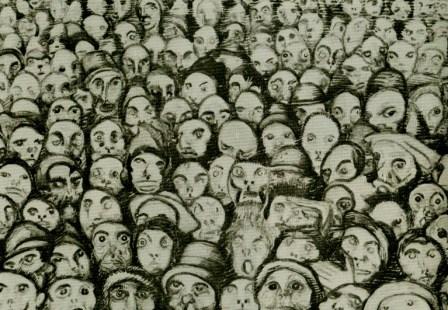
Josef Vachal: Cry of the Masses
Wiser than the bosses |
| Humans communicate. And humans are keen. It's basic textbook knowledge in social sciences that decisions are wiser and more far-sighted, if more opinions are taken into consideration. That's our strength: To form decisions from discussions. |
| Most of us, from time to time, feel some inner urge to contribute to some sort of on-going discussion. In our times of exploding mass communication, each of us is confronted each day with dozens of opinions. It's just human, that we do not share all these opinions. Sometimes we would even like to contradict, and we may search for an audience for our contradiction. |
| Our protest may be justified, and the opinion criticized by us really may be wrong or even dangerous. However, our protest often remains unheard. We may write a letter to the editor of a newspaper, but our letter is not published, for reason of limited space. We may even write a book, but our book is not published, for reason of lack of public interest. |
| Now this wonder of an internet came along. Everybody now can publish her/his opinion in the world wide web. And many do so. Millions do so. Me too. And millions read. I do. You do. But who is right, and who is wrong? Who decides on right and wrong? How influential are these texts? Isn't it rather so, that everybody hopes to be read, but is not much interested in that what others write? |
| Theoretically, the internet should offer the possibility to find the most relevant opinions to the most pressing problems in the world. In fact, millions are thinking about these problems, about the pollution of the environment, about democracy, about equal rights, about economic justice, about the aging population, about educational programs, about everything. |
| Among these thinkers are the smartest people in the world. And their opinions are open and freely available to everybody. It is theoretically possible, to collect via the internet the best opinions to the most pressing problems of the world, to discuss them, and to find nearly perfect solutions against ethnic violence, the energy crisis, for the nourishment of 10 billions, the eradication of malaria and tuberculosis, and the stopping of the HIV pandemic. |
| Theoretically. In reality most of these wise opinions are ignored, at least by those political institutions that have to come to decisions. They are, however, more and more heard by the masses. Due to the continued improvement of search engines, it is getting easier to find relevant and interesting opinions. It is not easy, to hide them away and to hold them down. |
| A good opinion has the advantage to communicate easily. Easy communication of good ideas inevitably leads to the destabilization of hierarchical societies. No business can be run on a long-term, if the subordinates are wiser than the bosses. Hierarchies can only be stable, if they are permissive for ideas from outside. They can no longer be stable in our days, if they are based on the wisdom of just one single person. |
| Nevertheless, it seems to be a basic human desire to trust into the wisdom of single subjects. Such blind trust often comes to the embarrassment of "leaders", that feel no desire to lead at all. It may take generations for a smooth transition from blind trust to responsible participation in dynamic cooperations. In the meantime, let's hope for modest leaders, knowing about their dispensability. |
| 6/11 < MB
(6/11) > 2/12 Freedom & Society see also: senders & receivers (1/06)
the source of art (6/12)
|